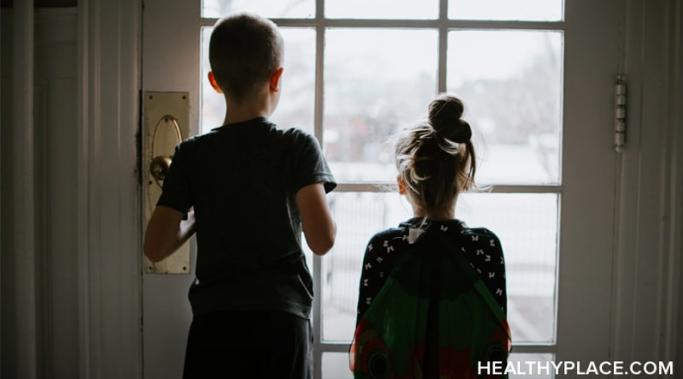Caregiver burnout is a very real phenomenon when supporting someone with mental illness. In my experience, caregiver stress and compassion fatigue arise as a result of putting your own needs to the bottom of your list on a consistent basis. I've experienced caregiver burnout on many occasions when supporting my brother with his mental illness -- and if I'm very honest, I'm experiencing it again right now.
Mental Illness and Caregivers
Marrying someone with a mental illness can cause challenges, but so can any marriage. A good friend of mine is married to a man with schizophrenia. And I know from my brother (who also has chronic mental health issues) that romantic relationships can be extra difficult when mental illness is thrown into the mix. My friend kindly shared some of her experiences with me, and I share them on this post with her blessing.
Many people aren’t sure whether or not to talk to kids about mental illness. When I was younger my aunt had frequent hospitalizations due to mental health issues, but I was told she had a sore back. I guess my family thought this was an inappropriate topic to talk to a child about. In hindsight, I think it could have been a positive conversation if I had been told about my aunt’s mental illness – here’s why.
Why does my loved one have a mental illness? Is there something I could have done to stop this from happening? I tormented myself with questions like this when my brother first became unwell with anxiety and depression -- and guess what? They only made things harder.
Feeling overwhelmed by supporting someone with mental illness is nothing to be ashamed of, but sometimes we can struggle to admit our true feelings. Here's a little bit about how I felt when my brother was diagnosed with chronic anxiety and depression.
I worry that my brother will die by suicide. Even typing those words feels frighteningly intimate because this very real fear is an unspoken one in our family. (This post contains a trigger warning.)
Making healthy boundaries with a mentally ill family member is a key step for your self-care as a supporter. Read on to learn more about the kinds of boundaries I have with my brother, who has chronic depression and anxiety.
Mental illness in the media can cause widespread public discussion. If you have real-life experience of mental illness, others may try to engage you in a conversation about media coverage, not realizing your story. I often find myself becoming upset by comments made by others on mental illness in the media because of my brother's chronic anxiety and depression.
When we were little, I spoke on behalf of my brother a lot because he had a speech delay. He would regularly mix up or mispronounce his words, and I would find myself acting as some sort of amateur translator when he spoke to anyone outside our immediate family. My most commonly used phrase was, "What he's trying to say is . . ."
This past weekend, my brother and I were reunited after quarantine -- seeing each other in person for the first time since March. He drove over to my house and met my new puppy, and we spent the day walking, eating, and generally catching up.









